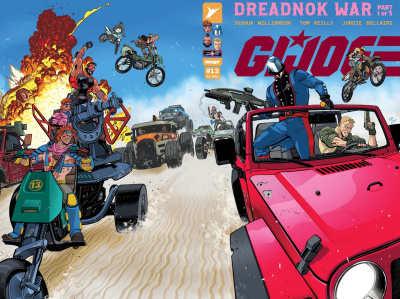 The market for comics and graphic novels in the U.S. and Canada reached $870 million at retail last year, according to a new estimate prepared jointly by ICv2’s Milton Griepp and Comichron’s John Jackson Miller.
The market for comics and graphic novels in the U.S. and Canada reached $870 million at retail last year, according to a new estimate prepared jointly by ICv2’s Milton Griepp and Comichron’s John Jackson Miller. "I’ve been networking with Milton on questions of the numbers underlying the business since he was at Capital City Distribution and I was editing Comics Retailer magazine back in the 1990s," Miller said. "It’s been great to formally collaborate on these estimates for the first time, and I think the result is the most inclusive and accurate picture of the market either of us has ever been able to produce."
"I’m very excited about the market model this collaboration with John has produced," Griepp said. "I’ve always had great respect for John’s work in the area of comic sales, and putting our heads together has enabled us to build a model that all can use to analyze and understand the market."
As presented in the accompanying infographic, the 2013 analysis by ICv2 and Comichron was divided up between periodical comics (what some call "floppies" or "pamphlets"), graphic novels, and digital download-to-own sales. Graphic novels contributed the largest portion ($415 million) and comic books nearly as much ($365 million), and digital (based on numbers released earlier by ICv2, see "Digital Comics Sales Grow to $90 Million") continued to grow faster than the market at $90 million. All print figures are calculated based on the full retail price of books sold into the market, and do not account for discounting or markup.
According to the report by Comichron and ICv2, comics periodical sales occur primarily in the comics store channel ($340 million) and to a declining degree in the “newsstand” channel ($25 million). For book format products, well over half of all graphic novel sales ($245 million) occur in the book channel, with a smaller share ($170 million) in the comics store channel.
ICv2 and Comichron also collaborated on market estimates for 2011 and 2012, revising earlier estimates by both. According to the new report, comics periodical sales grew from $300 million in 2011 to $335 million in 2012; graphic novel sales grew from $390 million in 2011 to $400 million in 2012; and combined comics and graphic novel sales grew from $690 million in 2011 to $735 million in 2012.
"It’s great that the comics market has found new ways to grow even as the over-all book and magazine markets remain challenged," Griepp said. "It’s proof of the fundamental entertainment and literary value of the comics medium."
"According to our records here at Comichron, without adjusting for inflation, this is the highest dollar value the market has reached since 1993," Miller said. "That’s great for the business, and we’re excited to see what comes next."
Comichron
Comichron is the world’s largest public repository of comic-book sales figures, featuring data from the 1930s to today about comic book and graphic novel circulation, cover prices, and market shares on its website, http://www.comichron.com. With data and analysis on the distant past as well as the present, Comichron serves as a trusted resource for academics studying the the historical reach of the medium and for collectors seeking accurate information about how many copies of a comic book originally circulated.
ICv2
ICv2 is the #1 industry source on the business of geek culture, including comics and graphic novels, manga and anime, movie/TV products, and hobby games, on its Website, www.ICv2.com, and in its magazine, Internal Correspondence. For the people on the front lines of the geek culture business, staying ahead of the trends isn't something that can be left to chance-it's a basic necessity for being successful. That's why ICv2 is the #1 source of news and information for the buyers, gatekeepers, and tastemakers on the front lines. ICv2 is where trend-watching is a science.







